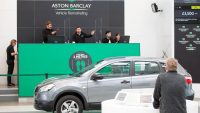The Society of Motor Manufacturers and Traders (SMMT) has already predicted that we will be producing 200,000 fewer cars this year than last as a result of the COVID-19 near global lockdown.
That translates to an 18 per cent drop in production this year minimum. The early signs of the impact of the global pandemic on the automotive manufacturing were revealed in February’s SMMT numbers: the UK produced 1,033 fewer cars translating into a 1.5% year on year drop for that month.
Since the SMMT made these predictions, nearly all car production in the UK has ceased – Aston Martin, McLaren Automotive and Morgan stopped production in the third week of March alone.
At the start of that same week Boris Johnson announced that all retailers, except essential ones such as food stores, post offices, laundrettes and pharmacies, must close to ensure UK citizens do not have unnecessary contact with each other as cases of the COVID-19 continue to rise across the UK.
Dealerships have a stay of execution from total closure as workshops, service centres and independent garages can stay open, along with petrol stations and car rental operations. The few that I was able to speak to were in the midst of controlled shutdowns of their service centre operations to protect their workers and their families from being infected. Most will be fully closed by the end of March.
In the same week, the chancellor Rishi Sunak unveiled the details of how senior management of dealerships and every other UK business with staff on their payroll will be able to ‘furlough’ their staff. It seems that extraordinary times demand extraordinary and little- used language as businesses across the land prepare to keep their staff sitting idle at home with 80 per cent of their salaries paid for by the Government up to average UK pay of £2,500 per month.
Businesses can elect to make up the pay difference or not. It’s a big judgement call if you are employing lots of above average, skilled staff normally earning great commissions. There’s a further snag for bosses: once furloughed you are not allowed to do any work for your employer at all. They cannot be contactable, aren’t supposed to answer business correspondence – they are in ‘work lockdown’.
Employees’ furlough period can be backdated to 1 March 2020 and will run for a maximum of three months to 31st May before possible extension (again by HM Treasury announcement). The money is not flowing through to employees’ bank accounts until June which leaves employers scrabbling to cover payroll before that even as losses mount.
Directors of companies will find it difficult to furlough themselves at least in the short-term during this transition. And its anticipated that other key staff will need to remain operational just to deal with all the paperwork and correspondence associated with effectively putting their organisations in ‘snooze mode’ – quite possibly until the end of May (everyone in business will be praying it’s over before then!)
New zero per cent interest for 12-month ‘Business Interruption Loans’ should be available from your business bank next week, again 80% guaranteed by the Government. But having tested that with my own business bank – they are still waiting for detail from Government so actually getting access to these loans may take more than a month. There is separate help for most of the self-employed, in the form of covering 80% of average monthly profits over three years.
It seems the economy is being kept going by the Government for, what’s currently assumed to be the whole of April and May and quite possibly longer. It will mean big changes in people’s lives as we all get used to living at home 24/7 with our immediate family; with only virtual or ‘socially distanced’ contact with neighbours, friends, other family members and work colleagues via Zoom, Skype, WhatsApp, email and good old fashioned phone calling.
Social distancing recommendations make even a trip to the supermarket or local shop seem like a risky ordeal, particularly for older and more vulnerable people and those with pre-existing conditions which make infection more life threatening.
Leaders of dealerships will be working hard to keep engaging with customers and prospects via digital channels and taking sales discussions as far as possible, requesting a delay before physical vehicle handovers happen. New safe handover systems may need to be put in place, supported by increased deep cleaning of vehicles before any handovers. Most will decide to just shut the door on new car sales completely through the next two months.
Whether you are a technician or salesperson being furloughed over the next few days, or working within a supplier to many dealerships which suddenly finds itself unable to supply goods and services to its customers that have effectively ‘gone dark’ (that’s us!), or indeed an owner or Dealer Principal of a dealership group; the key now is to be guided by our innate humanity – our moral compass if you will – in the decisions we make which affect the people we work with.
Trust is hard-forged but easily blown in moments like these when everyone is relying on each other for support. Several ‘big dogs’ of the corporate and political world have already been found wanting in communications and business behaviour terms as COVID-19 began ripping through the businesses they founded and built up.
Richard Branson was pilloried in the media for his public silence connected with news that Virgin Atlantic staff had all been asked to take eight weeks’ unpaid leave. He later promised £250m of his own money to look after them during this difficult time.
The JD Wetherspoon founder Tim Martin initially went public with his ‘instinct’ that closing pubs, bars and restaurants will not help stop the spread of COVID-19, counter to official government advice. Again, he later backtracked and apologised.
Immediately after that, Mr Martin found himself in a media storm over his company’s failure to pay a smaller beer supplier called Wimbledon Brewery for recent deliveries of Pitbull Pale Ale which the ex-England rugby star and commentator Brian Moore (who has collaborated with Wimbledon Brewery and given his nick name to this popular session beer) took very vocal exception to via Twitter and thence the Daily Mail.
Perhaps it’s a moment where a more compassionate type of capitalism needs to come to the fore. The endless, quarter by quarter run rate and profits chase must now be put on hold for at least the next eight weeks while we make sure our family, staff and people in our supply chain remain healthy, empathising with, and wherever possible alleviating, real hardships which many people will likely experience over the coming months.
Paul Smith heads Traka Automotive, which is part of the Assa Abloy Group brand.



































